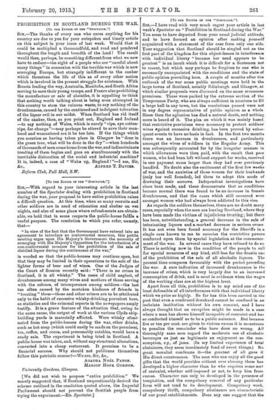[To THE Eorros or use SPECTATOR...1 Sin,—With regard to your
interesting article in the last number of the Spectator dealing with prohibition in Scotland during the war, your proposal to have entire prohibition raises a difficult question. At this time, when so many recruits and other soldiers are in need of relaxation and shelter on wet nights, and also of some place where refreshments are obtain. able, we hold that in some respects the public-house fulfils a useful purpose. The resolution to which you refer, namely, that— In view of the fact that the Government have entered into an agreement to introduce no controversial measures, this publics meeting urges upon His Majesty's Government the necessity of arranging with His Majesty's Opposition for the introduction of a non-controversial measure for the prohibition of the sale of distilled liquor during the continuance of the war,"
is worded so that the public-houses may continue open, but that they may be limited in their operations to the sale of the lighter forms of beer and of wines. One of the Judges of the Court of Session recently said: "There is no crime in Scotland, it is all whisky." The cases of child neglect, of drunkenness among many wives and mothers of those serving with the colours, of intemperance among soldiers—the last too often caused by the mistaken kindness of friends in " treating " them—these and other crimes are to he attributed only to the habit of excessive whisky-drinking prevalent here, as statistics and the criminal reports in the newspapers amply testify. His a grave feature of the situation that, owing to the same cause, the output of work at the various Clyde ship- building yards is materially affected. Were whisky elimi- nated from the public-houses during the war, other drinks, such as hot soup (which could easily be made on the premises), tea, coffee, and cocoa, and presumably eatables, would have a ready sale. The experiment is being tried in Scotland. A public-house was taken, and, without any structural alterations, converted into a cheap restaurant. It promises to be a financial success. Why should not publicans themselves follow this patriotic course P—We are, Sir, &c.,
AGATHA NOEL PATON. MARION HOYE GORDON.
University Gardens, Glasgow.
[We did not wish to propose "entire prohibition." We merely suggested that, if Scotland unquestionably desired the scheme outlined in the resolution quoted above, the Imperial Parliament should not prevent the Scottish people from trying the experiment.—En. Spectator.]






































 Previous page
Previous page